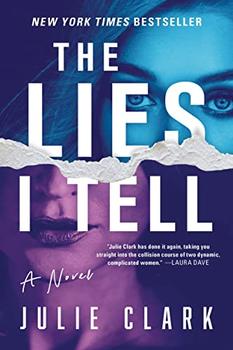Summary | Excerpt | Reading Guide | Reviews | Beyond the Book | Read-Alikes | Genres & Themes | Author Bio

A Novel
by Julie ClarkThis article relates to The Lies I Tell
 In Julie Clark's The Lies I Tell, main character Kat's boyfriend Scott struggles with a gambling addiction, which affects the two of them and their relationship. When asked in an interview what she wanted readers to take away from Scott's gambling problem, Clark stated, "I want readers to see the complexity and heartache of loving an addict. That they are more than the worst thing they've done."
In Julie Clark's The Lies I Tell, main character Kat's boyfriend Scott struggles with a gambling addiction, which affects the two of them and their relationship. When asked in an interview what she wanted readers to take away from Scott's gambling problem, Clark stated, "I want readers to see the complexity and heartache of loving an addict. That they are more than the worst thing they've done."
Sometimes referred to as a gambling disorder, or compulsive gambling, this type of addiction is characterized by the ongoing urge to gamble, even when it leads to consequences that have a destructive effect on one's life and the lives of others. Poker or other card games, playing slots and betting on sporting events are all activities that those with gambling addictions may develop a habit around, whether in person or online.
As the act of gambling compels people to risk something in the hopes of receiving more in return, it can interact with the brain in a similar way to how addictive substances like drugs and alcohol do, motivating someone to seek the feeling of being rewarded for taking a chance. The causes of compulsive gambling aren't clear-cut, and it can be tied to both genetic and environmental factors. It can also co-exist with and be linked to substance abuse problems and other mental health diagnoses such as depression, anxiety, ADHD (attention-deficit/hyperactivity disorder) and bipolar disorder.
Risk factors for gambling addiction include having other mental health disorders, being around people with gambling habits and taking certain medications, including antipsychotics and dopamine agonists (used to treat Parkinson's disease, among other conditions), that come with the rare possible side effect of compulsive behaviors such as gambling. Men are more likely candidates than women for a gambling addiction, and young people are more inclined to compulsive gambling than older people, though women who develop gambling problems tend to do so later in life.
There is no single recommended course of treatment for gambling disorders, and no medications have been approved by the FDA specifically for such disorders, but those affected by them can benefit from counseling or other types of therapy suited to their individual situations. HelpGuide gives practical advice for managing and seeking help for gambling addiction, including joining a support group such as Gamblers Anonymous.
Gambling addiction is a fairly common scenario to appear in television and movies. TV Tropes points out that a gambling problem may tend to crop up in sitcoms in particular because it can be plausibly built into a storyline relatively quickly: "It's…a very convenient 'habit' for a writer to use as a Compressed Vice because, as an emotional addiction, it doesn't carry outward signs that would have to be written in or accounted for later, and, as a legal or quasi-legal addiction, can be fully depicted in even some Family Friendly works and more 'realistic' as an addiction for some characters than, say, heroin." One example of this is a 1993 episode of The Simpsons in which Marge becomes addicted to playing slot machines.
Aside from Clark's novel, some modern works of fiction that portray gambling addiction include Swimming with Bridgeport Girls by Anthony Tambakis and The Ballad of a Small Player by Lawrence Osborne. One of the most famous depictions of compulsive gambling in classic literature is Fyodor Dostoyevsky's The Gambler, a short novel inspired by the author's own gambling problem.
Slot machine in casino, by Markus Spiske
Filed under Society and Politics
![]() This "beyond the book article" relates to The Lies I Tell. It originally ran in June 2022 and has been updated for the
March 2023 paperback edition.
Go to magazine.
This "beyond the book article" relates to The Lies I Tell. It originally ran in June 2022 and has been updated for the
March 2023 paperback edition.
Go to magazine.
Beware the man of one book
Click Here to find out who said this, as well as discovering other famous literary quotes!
Your guide toexceptional books
BookBrowse seeks out and recommends the best in contemporary fiction and nonfiction—books that not only engage and entertain but also deepen our understanding of ourselves and the world around us.